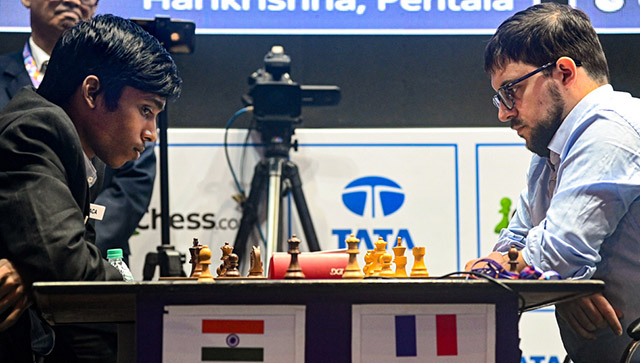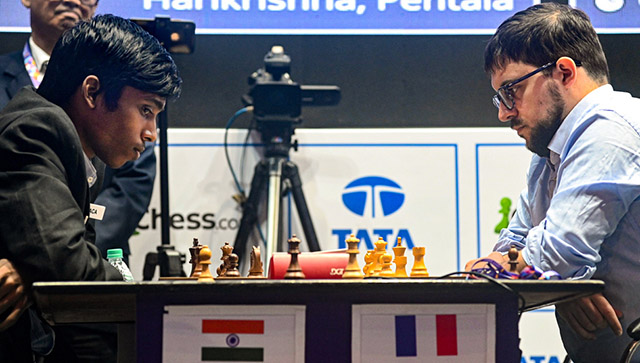Third time is the charm they say. And for the Indian team playing in the open section of the World Team Chess Championship, this just proved to be the case.
After losing to Poland and China in the first two rounds, the team put the pedal on the metal with their win in the third round against Belarus. And that definitely was not the end. In the fourth round, they demolished the US team with a score of 3.5-0.5. The fifth round against Egypt, however, turned out to be kind of a nightmare as India beat their much lower-rated opponents with a slim margin of 2.5-1.5.
Had it not been for Adhiban Baskaran’s win against Adham Fawzy, the score was dead equal. In the sixth round, the Indians faced Turkey. Having drawn against strong teams like Russia and China, and beaten the Polish team, Turkey was by no means an easy opponent. Even though the Indians were the favorites going by the team’s rating average (India’s rating average is 2675 while that of Turkey is 2599), the results Turkey had had so far painted a different picture. And they did continue their superb form by holding the Indians to a 2-2 draw.
The Indian women too came back from their defeat against Ukraine in the third round by getting the better of their closely matched opponent, Poland in round four. Things were pretty even as Harika Dronavalli, Tania Sachdev and Vijayalaksmi Subbaraman drew their games.
But the Bhubaneswar girl, Padmini Rout, rose to the occasion and won her game against Karina Szczepkowska to help India seize victory. In the fifth round, the Indian women, just like the open team, were paired against Egypt. But unlike in the open section, the Egyptians were beaten convincingly by the Indian women, although Dronavalli’s loss against the much lower-rated Shrook Wafa turned out to be an upset.
Nevertheless, everyone else in the team won their games and sealed a convincing 3-1 win. Unfortunately, the boot was on the wrong foot for the Indian women in their very next match against the second seeded Russia. While Dronavalli and Eesha Karvade held former world champion Alexandra Kostenuik, and Kateryna Lagno to draws, Rout and Subbaraman lost their games against Valentina Gunina and Girya Olga respectively to concede a 3-1 loss.
Vidit Gujrathi, who has been lurking around the 2700 rating mark for quite a while now, hasn’t had very encouraging results after his win against Wojtaszek in the first round. In round four, he was the only one to remain without a win against the American team. In the game, he was a pawn up and had strong pressure on his opponent’s position right until the endgame. But his opponent, Alexander Onishchuk, was able to trick him in the endgame and hold a draw. The rest of the games of round four were simply tremendous.
Baskaran came up with a strong piece sacrifice against Varuzhan Akobian after luring his opponent into committing mistakes in the opening. Ray Robson dared to play the Slav defence against Krishnan Sasikiran, who is a world renowned exponent of the opening. Sasikiran proved his prowess in this opening yet again and beat Robson convincingly.
The game Jeffery Xiong and Parimarjan Negi kicked off with an Italian opening in which the American sacrificed a pawn in the middle game for apparently no compensation. Negi, playing in a very practical manner, returned his extra pawn in the next few moves but was able to roll his queen-rook pawn down the board as compensation. It was this rook-pawn that created enough troubles for Xiong even in an opposite coloured bishop endgame which is generally considered to be drawn even if one of the sides has an extra pawn or two. But Negi’s pawns were too far apart for Xiong’s bishops. The American prodigy was forced to resign after 64 moves.
In the women’s section, playing against the Polish team, Dronavalli held a solid draw against Monica Socko in an English opening. The game, per se, was rather dull. Queens were traded quite early in the game and neither side wanted to risk too much. The players shook hands after 22 moves. Sachdev had a nightmare of an opening as her opponent lashed out with a piece sacrifice in a sharp Classical Spanish. Despite the opening mishap, Sachdev defended calmly and held her opponent to a draw in a 56-move-long battle.
Subbaraman too was caught in a bad position that cropped out of a Closed Spanish. She was a pawn down and had a much worse position but she defended tenaciously for 77 moves to save half-a-point. The only decisive game of the round was Rout against Karina Szczepkowska. In the game, Rout chose to go for the Worall Attack, a rare variation of the Closed Spanish. The game was very equal right until the endgame and Padmini had every reason to take a draw. But she kept pressing and after 77 moves, her efforts reached fruition and she was able to force a resignation from her opponent.
Round five brought another big upset for the Indian top-boarder, Gujrathi. Paired against the much lower-rated Hesham Abdelrehman from Egypt, Gujrathi sacrificed a pawn early in the opening and seemed to have no compensation. Had his opponent not made the mistakes he did, Gujrathi could have been on the tight ropes.
But Abdelrehman gave many chances to Gujrathi and at one point, the Indian No 3 was even better. The Egyptian Grand Master had to come up with some really accurate moves in the end to hold on to a draw. Just like Gujrathi, Murali Karthikeyan, who was replacing Sasikiran on board three, also found himself in a difficult position that arose out of an unorthodox Sicilian.
Things soon turned sharp but Karthikeyan was able to hold his ground in the complicated opening. It was in the middle game that his position started to look iffy. His opponent then sacrificed an exchange with the hope of advancing his pawns and Murali found himself in a cramped position, barely able to move any of his pieces. But Murali also came up with ideas to avoid letting his position go out of hand and in the end was able to force a draw by repetition after 67 moves.
Negi also suffered the same fate as Karthikeyan and Gujrathi. He too ended up in a difficult position but offered a draw to his opponent at the perfect time. Given that his opponent was lower rated than Negi and because the position although was better but not winning, his opponent took the proposed draw. While the team was about to be held for equality by a much lower-rated team, Baskaran stood up to the occasion yet again and won a fascinating game against Adham Fawzy to clinch the win for India.
In a game that began as a sharp Sicilian, Adham sacrificed a pawn early in the opening to develop his pieces freely. But this turned out to be fatal as Baskaran’s ‘c’ pawn, having captured the pawns on ‘b’ and ‘a’ files had reached deep into black’s position and was threatening its queen. Giving in to the pressure, the Egyptian International Master made an incorrect exchange sacrifice. Baskaran then pounced upon his opponent and even sacrificed his queen to get his queen-side pawns rolling with a decisive effect. In the final position, Baskaran only had a rook and two bishops (one of which was about to be captured) against Fawzy’s queen and rook. But his queen-side pawns were so far advanced that his opponent had no option but to resign!
The women too were paired against the Egyptians in their fifth round game. But unlike in the open section, Egypt was crushed by the Indian women. Sachdev won quite easily against Ayah Moaataz with white pieces. Karvade finished her opponent, Eman Elansary, with a pretty queen sacrifice and forced resignation. Subbaraman too had no problems converting her game against Tasneem Ehab into a victory. The only upset came on board one where Shrook Wafa beat Dronavalli on board one. In a classical Sicilian, the Egyptian Woman Grand Master fumbled early in the opening. But Dronavalli let the opportunity go by and didn’t exploit her opponent’s mistake. From then on, Ehab played almost perfectly to get the better of her Grand Master opponent.
In round six, the Indians were playing Turkey in the open section and the second seeded Russia in the women’s section. On the top board in the open section, Gujrathi was held to yet another draw by the Turkish Grand Master Dragan Solak.
In a game that started with the Slav Defence, Solak came out with one good move after another and forced the Indian Grand Master to spend time thinking about the best way to answer. By the 25th move, Gujrathi was already slightly low on time and chose to offer a draw to his opponent, which Solak accepted.
A big shocker came on board two where Baskaran lost to Mustafa Yilmaz after having won three games in a row in the last three rounds. Kicking off with a Meran, Baskaran played a bit too aggressively in the opening and ended up having to defend all the weaknesses he had inflicted upon his position and was down a pawn to add to his suffering.
As the game progressed, it seemed Baskaran was up for the task as he defended vigorously. But by the 53rd move, he fumbled again and now his position was beyond repair. After trying his best to defend until the 85th move, Baskaran decided to throw in the towel.
There were big hopes from Negi who had very good winning chances against Muhammed Batuhan Dastan. But rustiness seemed to have gotten the better of the Indian Grand Master who hadn’t played for a long time before this event. He not only messed up his winning chances in the game but was also on the brink of a loss at one point. At the end of this tumultuous encounter, Negi was able to come out with a draw. But with this draw, it meant that Sasikiran had to win his game if India were to avoid a loss against Turkey. And the most experienced Grand Master in the team showed that he was up for the task! Playing with white pieces against Emre Can’s Sicilian Najdorf, Sasikiran produced a beautiful win to level scores with the Turkish team.
In the women’s section, however, India suffered a bitter defeat. Playing against the former women’s world champion, Alexandra Kostenuik, Dronavalli found herself in a difficult position out of the opening but was able to save half-a-point by repeating the position after 29 moves of play.
Karvade was also in a very difficult situation right from the start of the game. In fact, even in the final position, she was worse. But her opponent offered her a draw since Russia had already won the match as Valentina Gunina and Girya Olga had beaten Rout and Subbaraman respectively.
In the game between Olga and Subbaraman, the Indian Woman Grand Master blundered a piece very early in the game and her opponent had no problems converting the win. On board three, Rout showed some really creative play and posed as many problems as she could to Gunina. After getting into a worse position, Rout lashed out with an interesting piece sacrifice to create chances against Gunina’s king. The Russian Grand Master did well defending but the critical point came on move 33 when Rout simply missed her opponent’s next move and let the position go out of hand.
After six rounds, both the open and women’s team are on the fifth spot in the tournament. In round seven, India will be facing Ukraine in the open and China in the women’s section. With three more rounds to go, it will be interesting to see if India can set another comeback and secure a medal at this event.


)




)
)
)
)
)
)
)
)